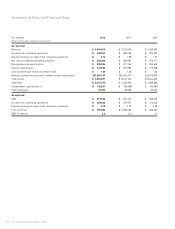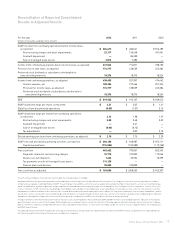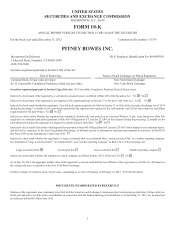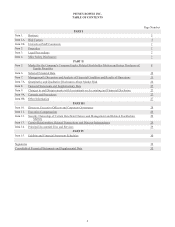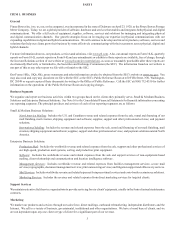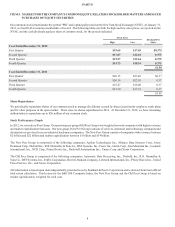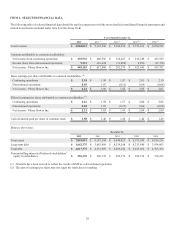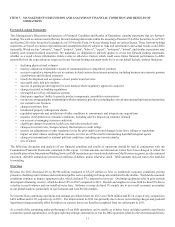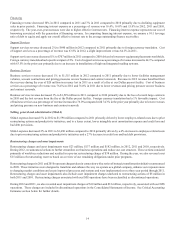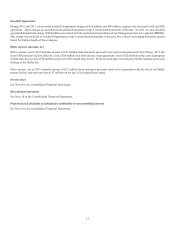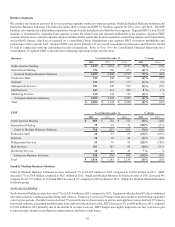Pitney Bowes 2012 Annual Report Download - page 24
Download and view the complete annual report
Please find page 24 of the 2012 Pitney Bowes annual report below. You can navigate through the pages in the report by either clicking on the pages listed below, or by using the keyword search tool below to find specific information within the annual report.6
disruptions in manufacturing and operations including product shortages, higher freight costs and re-engineering costs. If outsourcing
services are interrupted or not performed or the performance is poor, our ability to process, record and report transactions with our clients
and other constituents could be impacted. Such interruptions in the provision of supplies and/or services could result in our inability to
meet client demand, damage our reputation and client relationships and adversely affect our business.
Market and business deteriorations and credit downgrades could adversely affect our cost of funds and related margins, liquidity,
competitive position and access to capital markets.
We provide financing services to our clients for equipment, postage and supplies purchases. Our ability to provide these services is
largely dependent upon our continued access to the U.S. capital markets. An additional source of liquidity consists of deposits held in
our wholly owned industrial loan corporation, The Pitney Bowes Bank. A credit ratings downgrade, material capital market disruptions,
significant withdrawals by depositors at The Pitney Bowes Bank, adverse changes to our industrial loan charter or a significant decline
in cash flow could impact our ability to maintain adequate liquidity and provide competitive offerings to our clients. If such events
occurred, there can be no assurance that liquidity funding sources would be available or sufficient, and those funding sources that may
be available could result in a significantly higher cost of borrowing and adversely impact our ability to fund various discretionary priorities,
including business investments, pension contributions and dividend payments.
Failure to comply with privacy laws and other related regulations could subject us to significant liability and damage our reputation.
Several of our businesses use, process and store client information that could include confidential, personal or financial information. We
also provide third-party benefits administrators with access to our employees' personal information. Privacy laws and similar regulations
in many jurisdictions where we do business, as well as contractual provisions, require that we and our benefits administrators take
significant steps to safeguard this information. These laws are continuing to evolve. We, and our third-party benefits administrators,
have security systems and procedures in place that are designed to protect against unauthorized access to such information; however,
there is no guarantee that experienced computer programmers or hackers will not be able to gain access to our securities systems or the
security systems of our third-party benefits administrators and misappropriate confidential information. Any significant violations of
data privacy, disclosure of other confidential information or failure to comply with any of these laws, regulations or contract provisions
could damage our reputation and business and subject us to significant remediation costs and/or liability.
A disruption of our information technology systems could adversely impact our business and operating results.
Our portfolio of product, service and financing solutions is dependent on reliable information technology systems. We maintain secure
systems to collect revenue for certain postal services, which is critical to enable both our systems and the postal systems to run reliably.
In addition, we rely extensively on our computer systems to manage our business. These systems are subject to adverse acts of nature,
targeted or random security breaches, cyber-attacks, computer viruses, vandalism, power loss, computer or communications failures and
other unexpected events. Although we have disaster recovery plans in place to protect our business operations in case of such events,
those plans may not be successful. If our information technology systems are damaged or cease to function properly, we could be prevented
from fulfilling orders and servicing clients and postal services. Also, we may have to make a significant investment to repair or replace
these systems, and could suffer loss of critical data and interruptions or delays in our operations. The continuous and uninterrupted
performance of our information technology systems is critical to our ability to support and service our clients, to support postal services
and to manage our business.
Our inability to obtain and protect our intellectual property and defend against claims of infringement by others may negatively impact
our operating results.
We do not believe our businesses are materially dependent on any one patent or license or group of patents or licenses. However, we
rely on copyright, trade secret, patent and other intellectual property laws in the United States and similar laws in other countries to
establish and protect proprietary rights that are important to our business. If we fail to enforce our intellectual property rights, our
businesses may suffer. We, or our suppliers, may be subject to third-party claims of infringement on intellectual property rights. These
claims, if successful, may require us to redesign affected products, enter into costly settlement or license agreements, pay damage awards,
or face a temporary or permanent injunction prohibiting us from marketing or selling certain of our products.
If we fail to comply with government contracting regulations, our operating results, brand name and reputation could suffer.
Many of our contracts are with governmental entities. Government contracts are subject to extensive and complex government procurement
laws and regulations, along with regular audits of contract pricing and our business practices by government agencies. If we are found
to have violated some provisions of the government contracts, we could be required to provide a refund, pay significant damages, or be
subject to contract cancellation, civil or criminal penalties, fines or debarment from doing business with the government. Any of these
events could not only affect us financially, but also adversely affect our brand and reputation.




